We asked the staff of Farrar, Straus and Giroux to pick the best book published this year, name their favorite titles—old, new, or forthcoming—that they read or reread this year, and share which FSG books they’ll be gifting during the holidays.
THE BEST BOOKS PUBLISHED IN 2018
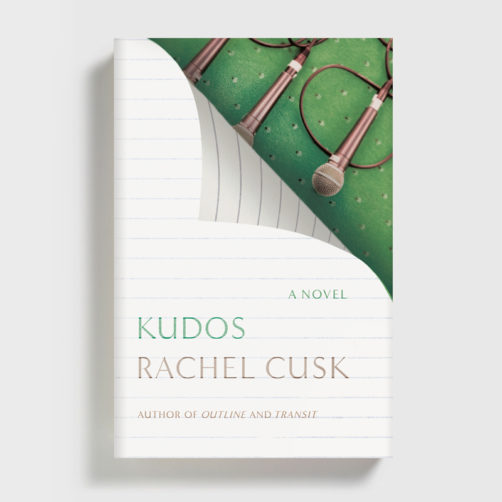
Kudos by Rachel Cusk
More than forty books were nominated by the FSG staff as their picks for the “best book of the year” but the top spot, with eight votes, was taken by Kudos, written by our very own Rachel Cusk (Kudos is the final installment in Cusk’s Outline trilogy).
In second place was Ottessa Moshfegh’s My Year of Rest and Relaxation, which had five votes.
In third place with four votes was The Mars Room by Rachel Kushner, and tied for fourth place with three votes each were Rebecca Makkai’s The Great Believers, Tommy Orange’s There There, and our very own Ling Ma’s Severance.
Other titles that received multiple votes were The Recovering by Leslie Jamison, A Lucky Man by Jamel Brinkley, Heavy by Kiese Laymon, and Asymmetry by Lisa Halliday.
OUR FAVORITE READS THIS YEAR
Jamel Brinkley’s A Lucky Man is the most evocative fictional exploration of masculinity I’ve read maybe ever, and the best short stories I’ve read all year. Tender, rich, painful, subtle, and glowing, each story introduces you to young men of color struggling to find identity in relation to the world containing them. These young men juggle sexuality and family and society and love with human vulnerability and adolescent impulsivity. The book is also an amazing and atmospheric plunge into New York City, specifically the predominantly Black and Latinx neighborhoods of Brooklyn during the ’80s and ’90s. The pacing is near-perfect—the stories brew and develop until the consequences of some internal breaking point erupts like a gunshot—and I feel like I’ve known these characters forever. This collection made me miss a stop on my train and I’m not even mad at it.
I also fell in love with Chris Adrien’s celestial, disturbing, world-warping stories in A Better Angel, which I still can’t get out of my head, and Chris Rush’s monumental coming-of-age memoir The Light Years (out in April). I also deeply enjoyed, in no order, Maryse Meijer’s forthcoming Rag, Alan Hollinghurst’s The Line of Beauty and The Sparsholt Affair, Denis Johnson’s Train Dreams, Suzy Hansen’s Notes on a Foreign Country, Aleksandar Hemon’s The Book of My Lives, Valeria Luiselli’s The Story of My Teeth, Akwaeke Emezi’s Freshwater, Anne Garréta’s Sphinx (translated by Emma Ramadan), the Jennifer Baker-edited collection Everyday People: The Color of Life, Fernando A. Flores’s Death to the Bullshit Artists of South Texas, Laura van den Berg’s The Third Hotel, Brian Phillips’s Impossible Owls, and Rachel Cusk’s Kudos.
JACKSON HOWARD
• • •
A longtime resident of my TBR list, this year I finally got my hands on a copy of Kristen Radtke’s effusively gorgeous graphic novel Imagine Wanting Only This. Its depictions of the intersections of ruin, impermanence, and transience have been lingering with me ever since. And, a devastating character study of a region that grips you like a thriller, Stephen Markley’s Ohio is the book we need right now. My favorite kind of novel tells its story by illuminating the most quiet, intimate parts of a life—the wonderment, the despair, the sheer ache. Kate Greathead’s Laura & Emma is such a novel.
Maryse Meijer’s Rag officially pubs this coming spring but get it on your radar now. This volatile, thoroughly disquieting collection of stories will not go down easy—but Meijer has rendered them somehow compulsively readable and beautiful in her exquisite use of language. You will not be able to stop thinking about them.
NIKKI BARNHART
• • •
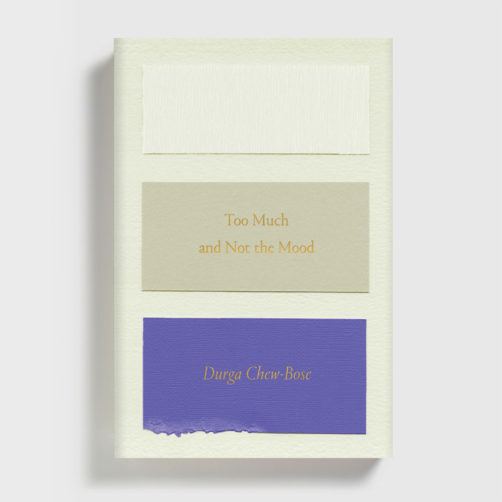
Too Much and Not the Mood by Durga Chew-Bose
2018 was filled with great reads, but there are three books that stand out from the rest. At the top of the list is Loitering by Charles D’Ambrosio, which no doubt will be my favorite essay collection for quite some time. It’s a grab bag of a book, and the topics range from eating whales and reexamining Salinger’s body of work to what it is like to live in a readymade furniture factory. D’Ambrosio is that rare essayist that begins with a thought or moment and truly follows it out to its end, prioritizing feeling over form and letting the essay unspool and roam free. The only similar essayist I’ve found that weaves so loosely and lyrically is Durga Chew-Bose (Too Much and Not the Mood)—both writers feel so fresh in how they interweave thoughts and carve out structure through tangential reflections.
Ever since stumbling across The Age of Wire and String, I have been in absolute awe of Ben Marcus’s mind, and his new book Notes from the Fog held up to my wildest expectations. As ever, Marcus puts brilliant language to the mundane and automated processes of modern life, detailing the strangeness of our world and the ways in which we operate in society. With a disconcerting outlook that could only be matched by Gary Lutz, the stories in Notes from the Fog lay bare and reexamine the family unit, big pharma, and growing technologies that are becoming more and more inseparable from our lives.
Another story collection that floored me was Amy Hempel’s Reasons to Live. Late to Hempel, I was hooked from the very first page. Each and every one of her sentences just feels exactly right. There is such a flow and intuition to her writing that I had to remind myself to slow down and try to understand how each story carries so much meaning with such little language. Just as in Diane Williams’s or Raymond Carver’s stories—both of whom were also edited by Gordon Lish—Hempel carves out an oblique yet simmering examination of the muzzled emotions that lie beneath our daily goings-on.
PATRICK DUNHAM
• • •
The Flame, by far. And frankly of my own, I loved Happiness Is a Choice You Make.
SARAH CRICHTON
• • •
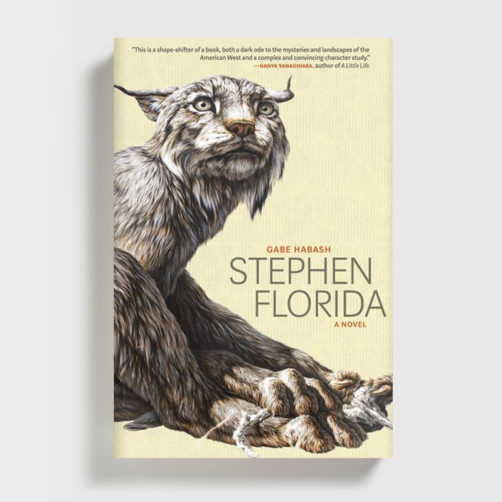
Stephen Florida by Gabe Habash
Stephen Florida by Gabe Habash: I never would’ve thought I’d so love a novel about a Division IV college wrestler’s mental unraveling. While the book jacket’s comparison to The Art of Fielding was not encouraging, this deranged character study is dazzlingly weird, unsettling, funny, tragic, and one book I wish I’d acquired.
The Transit of Venus by Shirley Hazzard: I’d been seeing this book everywhere, often mentioned as an overlooked classic and ardent favorite. Once I pushed through the slow start and finally tendered my full attention (and Hazzard rewards attention), I understood. Her frank style disguises cunning depths in each sentence, and the structure is masterful. Reading, you discover that the novel is a puzzle; by the time the pieces begin to cohere, you’re hopelessly in love with the characters, whose fates have been seeded and sealed from the beginning. A devastating and awe-inspiring novel—I’ve been recommending it to everyone I know. Also (I tend to babble about this book), an aspiring writer of my acquaintance mentioned her struggle with conveying the passage of time in fiction, particularly in dialogue (i.e., when you want to convey that characters have been talking together for some time without writing hours’ worth of dialogue). With time, as with many other layers of her craft, Shirley Hazzard evinces utter control, yet with the lightest touch. Despite the novel’s careful structure, it never once feels artificial or forced.
The Years by Annie Ernaux: Proust meets the Sears catalogue meets Rachel Cusk. That might sound impossible—and it is; Annie Ernaux is magic. Scintillating, delicate, moving in the most surprising way, The Years ravels up the strands of pop culture, consumer products, world events, and personal minutiae that describe a life, and is the triumphant capstone of the seventy-eight-year-old Ernaux’s career.
JULIA RINGO
• • •
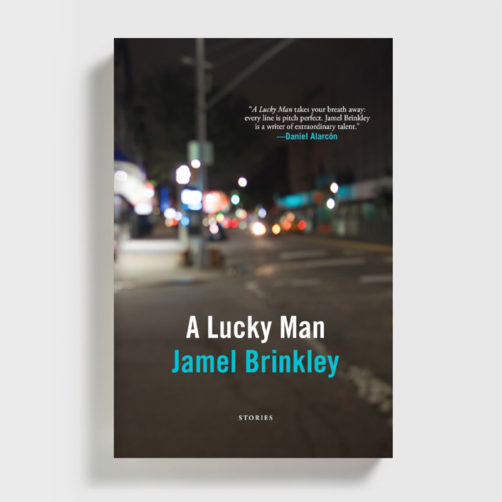
A Lucky Man by Jamel Brinkley
I read A Lucky Man by Jamel Brinkley over the course of a weekend this summer. This is a tender, stunning book that broke my heart open. Each page is tinged with pain and beauty and I found it to be honest and generous beyond belief. I’ll be revisiting this one.
Rebecca Makkai’s The Great Believers was all-encompassing and filled with compelling characters that jumped off the page. In fact, not since Hanya Yanagihara’s A Little Life have I felt this attached to characters in a novel—I still think about them all the time.
I read Ottessa Moshfegh for the first time this year and felt simultaneously electrified and scandalized by Homesick for Another World and My Year of Rest and Relaxation.
Lydia Davis’s Break It Down was tough and self-aware and made me laugh out loud. There’s really no one quite like her.
Other favorites from this year include Leslie Jamison’s The Recovering (powerful, brilliantly researched), Chris Rush’s The Light Years (forthcoming from FSG, the most fun I’ve had reading a book in a while; I’ve already passed the galley on to a number of people), John Williams’s Stoner (came highly recommended and was as satisfying a reading experience one can have), Arundhati Roy’s The God of Small Things (sensuous, devastating), and Garth Greenwell’s What Belongs to You (luminous, worth every bit of praise it’s received).
CHLOE TEXIER-ROSE
• • •
If the best book I read in 2018 was judged by the number of passages I underlined, drew exclamation points next to, or sent friends photos of, the winner would be Elif Batuman’s The Idiot. Set in my birth year of 1995, the novel is narrated by Selin, a language-obsessed Harvard freshman who falls in love with a boy via email. Contrary to the title, Batuman is one of the smartest people I’ve ever read/listened to/dreamed of having my life narrated by. Even her simplest observations are astute and hilarious. For instance, “The beets didn’t correspond to any ideas I had previously held” stuck with me for months.
I also read every Ottessa Moshfegh book this year, with Homesick for Another World and Eileen competing for the favorite. Moshfegh writes about human nature accurately and disgustingly. Her books are gross and engrossing and I could not put them down.
Also notable are Rachel Cusk’s Outline trilogy (duh), Patricia Lockwood’s Priestdaddy (follow her on Twitter), and Hanif Abdurraqib’s They Can’t Kill Us Until They Kill Us (god bless the Midwest).
ALEXIS NOWICKI
• • •
The First Wife by Paulina Chiziane. This is one of the funniest and most provocative satires I have ever read. It’s about a woman who organizes her husband’s various lovers to make sure he legally marries them all, and how the new wives and their children gain standing in society after the marriages—to put it simply. The shifting power dynamics and feminist enterprise in this novel make it really exciting.
Human Hours by Catherine Barnett. Wow, this book made me laugh out loud and then nearly cry while in line at the Javits Center Starbucks, where, at this year’s BEA, I first read a galley (it was a long line). I reread the book afterwards and the immediacy of the collection astonished me even more. Barnett has the intelligence and generosity of spirit to write about big, devastating topics in the liveliest ways.
LAUREN ROBERTS
• • •
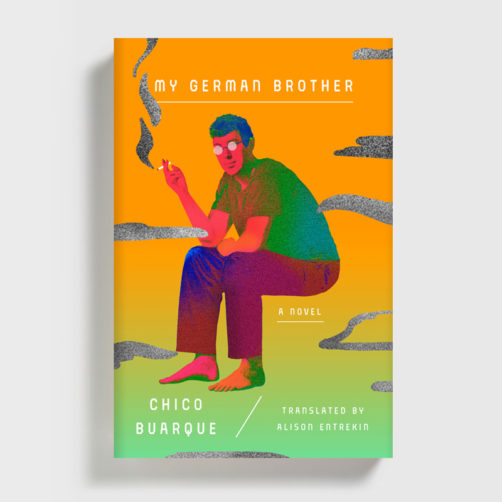
My German Brother by Chico Buarque
One of my favorite books I read this year was My German Brother by Chico Buarque. The narrator Ciccio finds a letter written to his father from a German woman and becomes convinced that his father had had an affair with her and that he has a brother in Germany he’s never met. This sparks Ciccio’s journey to track down this mystery brother, who may or may not exist, and unleashes a wild quest through books, letters, neighbors’ homes, and Ciccio’s mind. The writing takes on the feel of a stream of consciousness, pulling us through dreamy and hazy scenes that often solely exist in Ciccio’s head as he attempts to supplant his fantasies on reality. However, the more we look through this unreliable narrator’s eyes, the harder it gets to distinguish the real from the imagined and the more we believe in his quest.
I read my first ever Vonnegut book this year, Slaughterhouse Five, and was absolutely captivated by it. I found myself furiously underlining and taking notes. The questions the book poses about time and memory in the face of a trauma were made all the more poignant by our uncertainty about how much control Billy even has over his own narrative and movement through time. Also, I want to mention Kathryn Scanlan’s Aug 9—Fog (out June 2019), which pieces together and rearranges journal fragments from a stranger’s diary Scanlan found at an estate auction. Each page has just a line or two grouped by season, and it was incredible to feel myself becoming so invested in the world of this stranger. It offers a minimalist portrait of a life that is extremely touching and that celebrates the beauty of the everyday. Readers are left to fill in the gaps and participate in building the narrative.
MAIA SACCA-SCHAEFFER
• • •
My favorite books this year were Sabrina by Nick Drnaso, Another Country by James Baldwin, and Bad Blood by John Carreyrou.
LAIRD GALLAGHER
• • •
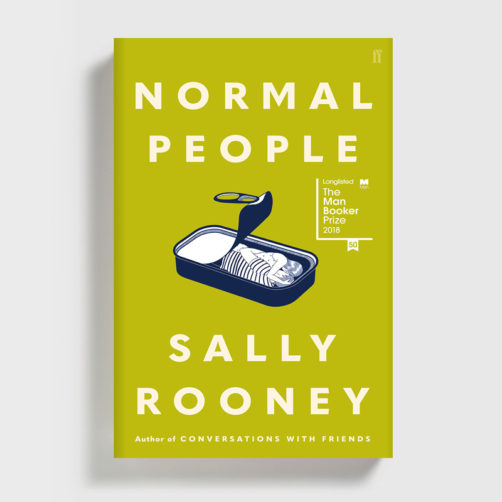
Normal People by Sally Rooney
Normal People by Sally Rooney. There are very good reasons for why The New York Times is calling Sally Rooney the “First Great Millennial Author.” I’ve never been so instantly transfixed by a book before, so deeply aware that the story before me held something entirely telling of our time. When the book’s wrong-side-of-the-tracks love story unravels, Normal People reveals itself to be a tale so deeply ingrained in gender politics, millennial angst, and the ever-expanding complexities of family and trauma that I found myself convinced that Sally Rooney knows me, knows you, knows everyone else in the world. I read this book in twenty-four hours and you will too.
Who Will Run the Frog Hospital? by Lorrie Moore. Back in June, when I left my bookstore job in Michigan to move to New York and work for FSG, I felt lost, scared, and sad in a city that made no sense to me. It was a constant upheaval of What is New York? Do I Really Love Books Enough for This Shit? Where Even Am I? So, naturally, I went back to a bookstore. I picked up Lorrie Moore’s Who Will Run the Frog Hospital? (novel, short, perfect for subway reading) at Three Lives & Company and it was exactly what I needed: a place to pour all my lingering nostalgia and wistfulness for childhood and home. A book that made me so emotional on the 4 train that the person sitting next to me got up and moved to another car. A book full of stunners like this one: “I often think that at the center of me is a voice that at last did split, a house in my heart so invaded with other people and their speech, friends I believed I was devoted to, people whose lives I can simply guess at now, that it gives me the impression I am simply a collection of them, that they all existed for themselves, but had inadvertently formed me, then vanished. But, what: Should I have been expected to create my own self, out of nothing, out of thin, thin air and alone?” So I guess it’s true: I Really Do Love Books Enough for This Shit.
CLAIRE TOBIN
• • •
Cedric Robinson’s Black Marxism: The Making of the Black Radical Tradition had been on my to-read list for quite some time, but this year, amidst the ceaseless dumpster fire that is American capitalism, I finally got my local library to hold down a copy for me. In a year where it seems everyone I know has suddenly become aware of the writings of Karl Marx, I was energized by Robinson’s dismissal of a European model of history and his assertion of the significance of Black communities as agents of resistance and progress.
The Black Jacobins by C. L. R. James is the definitive account of the Haitian Revolution—a model for liberation movements across the world to this day. This is a dramatic account of the story of Toussaint L’Ouverture’s successful leadership of the first anti-colonial insurrection. And it’s basically what you should be reading instead of fawning over Lin Manuel Miranda’s revisionist account of the American Revolution. I try to read it at least once a year.
DANNY VAZQUEZ
• • •

Heavy by Kiese Laymon
This year, I felt the formulaic differences between every book I read and the many different avenues available for travel to the same destination. Less by Andrew Sean Greer felt as satisfying as getting the perfect square from a massive, random number—clean and faultless; no word written without intent. Also, I was so gutted by Heavy (Kiese Laymon), one of the most important and honest books I’ve read in ages—part dissertation, part personal disclosure of a historically festering, neglected wound. The Human Stain by Philip Roth should be required reading and stands as a major reminder that the past does not remain in the past. Themes of shitty presidents, racial tension, sexual intimidation, misogyny, miscommunication, sabotage (all painfully relevant today) are screaming on every page. Paul Auster’s epic, 4321, plops the same protagonist in four different storylines—each one uniquely sympathetic, brash, and creative. Somehow equally doomed and hopeful, there are infinite beginnings and ends. And The Great Believers by Rebecca Makkai jumps back (1987 Chicago during the apocalyptic AIDS crisis) and forth (2015 Paris where a mother searches for her estranged daughter) in time until the two periods come to a despairing head. (I cried, I laughed, I cried.) And last but not least is The English Patient by Michael Ondaatje—a poetic saga wherein war and love are intertwined.
VERONICA INGAL
• • •
To the Lighthouse, by Virginia Woolf. Absolutely one of the best novels I’ve ever read. I keep thinking of it as condensed Proust, which is not actually apt, but like Proust, Woolf manages to capture the essence of interior life.
Memoirs of Hadrian, by Marguerite Yourcenar. I really didn’t want to say something as pat as “Yourcenar brings the past to life.” But she does, and it’s why you should read this book.
Death Comes for the Archbishop or My Ántonia, by Willa Cather. I’m not sure I could pick one over the other; they were the highlights of a brief Cather binge this year, and each had a single line that made me tear up (both lines were about friends parting forever).
And, as a runner-up: Providence, by Anita Brookner. Another melancholy book. Brookner is succinct and precise, her novels structurally perfect, and she tempers her bitterness with humor. My yardstick for measuring the quality of a used bookstore has become whether there’s any Brookner on the shelves.
SCOTT AUERBACH
• • •
This year I read a couple of terrific graphic books. Sabrina by Nick Drnaso, the first graphic novel nominated for the Man Booker Prize, is beautifully told, powerfully told, and drawn with real precision. Conditions on the Ground by Kevin Hooyman was recommended to me by the owner of Desert Island Comics in Brooklyn, and I had more fun reading it than any other book this year.
Territory of Light by Yuko Tsushima, a small and terrific novel coming out from FSG in February, is the story of a young woman, left by her husband, as she raises their two-year-old daughter in 1970s Tokyo. Each chapter is a month of their lives and stayed with me long after I finished reading it. There There by Tommy Orange has one of the best openings I’ve read in a long time. Read the prologue now! The book does a great job of telling the stories of the diverse and disparate people in the Native American community around Oakland, California. Finally, as the father of a young child, I do a lot of reading of children’s books. Many of them are pure dreck, but there are a few that I’m happy to read over and over and over and over and over. One of those is The Sound of Silence by Katrina Goldsaito (illustrated by Julia Kuo), which tells the story of a boy in Tokyo trying to track down silence in his everyday life. I’m always angling to read that one and avoid others.
DANIEL DEL VALLE
• • •
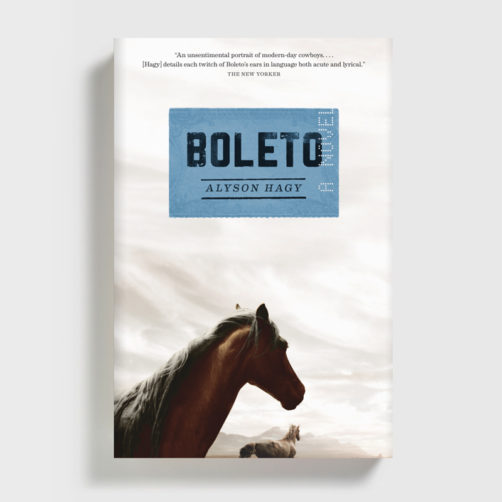
Boleto by Alyson Hagy
Jamel Brinkley’s A Lucky Man stuns you line by line and adds up to something that keeps you charged and aching for weeks. In the shortest phrase, the quickest glimpse, he slips you right into the wideness of childhood then to the constraining complexities of adulthood and back again. It is immediate and gorgeous and unforgettable.
Edward Carey’s Little is a book I have been waiting a long time to be able to recommend. It is truly transporting and strange and wonderful—full of art and humanity. It burrows into you and stays.
Here’s my annual plug for Tove Jansson, whose books I am parceling out to myself one per summer. Her story collection, The Woman Who Borrowed Memories, is a master class in the power of pause and, if you’ve read her novels, surprises in its lushness and layered detail. These stories stare just as unblinkingly into the darkness—of the world, our psyches, our relationships. I wish there were an illustrated edition.
I loved Alyson Hagy’s Boleto a few years ago and though I haven’t finished her new book, Scribe, it’s already one of my favorites of 2018. A society reduced to a trading economy where a woman gains authority based on her ability to write letters? YES. Beautiful language and gripping plot? YES. A heroine who is canny and independent and sexually powerful? ABSOLUTELY. It’s a timely and timeless wonder, this book.
JENNA JOHNSON
• • •
Questioning Minds: The Letters of Guy Davenport and Hugh Kenner, edited by Edward M. Burns: When this book was announced I called it as “best of 2018,” preemptively, and I stand by said calling. I’m only about a quarter of the way through. I read a letter or two each morning with my tea. At this rate, it may also be my best book of 2019, but so be it.
Sand, Wolfgang Herrndorf, translated by Tim Mohr: A great “page-turner,” a sort-of spy novel, a sort-of existential comedy, also actually a Great Novel. What a pity that there will be nothing further from Herrndorf.
An Untouched House, W. F. Hermans, translated by David Colmer: Hermans is an old fave. This one is like Simenon distilled down to his nastiest essential salts. More, please.
The Pursuit of Love, Nancy Mitford: Not at all Masterpiece Theater fluff, or not only. A real novel, and great fun.
A House for Mr. Biswas, V. S. Naipaul: Yes, I did the thing your mother does and finally got around to reading a beloved classic just because the author died. So, sue me. It’s wonderful, isn’t it.
Convalescent Conversations, Laura Riding: I’m something of a freak for Laura Riding/Laura (Riding) Jackson’s fiction. I was delighted to see a wholly unknown novel or “novel” of hers reprinted. A pro-paralysis polemic. Frustrating and fussy and peculiar and funny.
The Man Who Fell to Earth, Walter Tevis: No doubt in prophetic anticipation of the demise of the great Nicolas Roeg, who directed the beautiful and wonderfully scatterbrained David Bowie-starring film adaptation, I finally made time for this. It may be a better book than the movie is a movie, but happily we have both versions to comfort us as our own planet dies.
JEREMY DAVIES
• • •
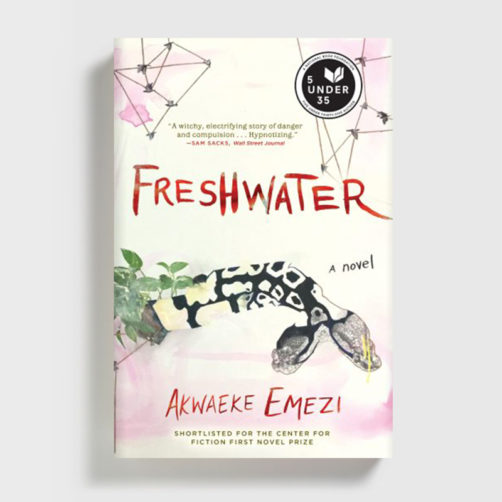
Freshwater by Akwaeke Emezi
My favorite book that came out in 2018 has to be Akwaeke Emezi’s Freshwater, a book unlike anything I’ve read before. Most broadly, it’s about a young Nigerian woman named Ada who goes to college in America, and a series of violent encounters that lead her to rely on the alternate selves lurking in the back of her mind. It’s tempting to explain these voices with simple interpretations: in some ways this is a fantasy novel about Ọgbanje, evil spirits that are born to die. Or maybe Ọgbanje are a metaphor for mental illness; perhaps Ada is experiencing dissociative identity disorder or schizophrenia, and in her mind these illnesses manifest as evil spirits. And yet each of these interpretations alone is too simplistic. What makes this semi-autobiographical novel so powerful is its resistance to reductive symbolism, and its defiance of western perspectives of identity and dysphoria.
This year I read three popular YA books with 2018 film adaptations. Each is great for different reasons: Angie Thomas’s The Hate U Give is a devastating, important depiction of racism and police brutality, while Jenny Han’s To All the Boys I’ve Loved Before is a supremely fun romantic comedy. But Becky Albertalli’s Simon vs. the Homo Sapiens Agenda, which became the movie Love, Simon, has to be my favorite—it’s an empowering, emotional coming-out story, sure, but what makes it so universal is how it subtly uses queerness as a metaphor for any new part of yourself you might be discovering as you grow up. We’re all constantly in the process of “coming out” to ourselves and to everyone we know, reconciling the new, developing parts of our personalities with what we’ve always known.
BENJAMIN ROSENSTOCK
• • •
My favorite thing this year has been opening Deborah Levy’s slim memoir The Cost of Living to a random page and having the breath knocked out of me all over again by her sparkling insight and piercing wit. Every time, I am surprised anew by how much I love her writing. It’s somehow both ironic and exhilarating, and it feels like returning to Virginia Woolf’s A Room of One’s Own, but without traveling all the way back to first-wave feminism.
I’ve also recently fallen in love with the children’s book Julián Is a Mermaid by Jessica Love. Love’s lively watercolor, gouache, and ink illustrations dance across the brown-paper-bag pages of this simple but affecting book about a young boy who wants to be a mermaid and his abuela, who supports his dream. I may have cried in the bookstore over this one. Do the small people in your life a favor and read it to them!
LYDIA ZOELLS
• • •
The Bell, by Iris Murdoch. A novel that manages to be funny, big-hearted but unsparing, and engages some large moral and spiritual themes while never feeling didactic or losing its sense of plot.
COLIN DICKERMAN
• • •
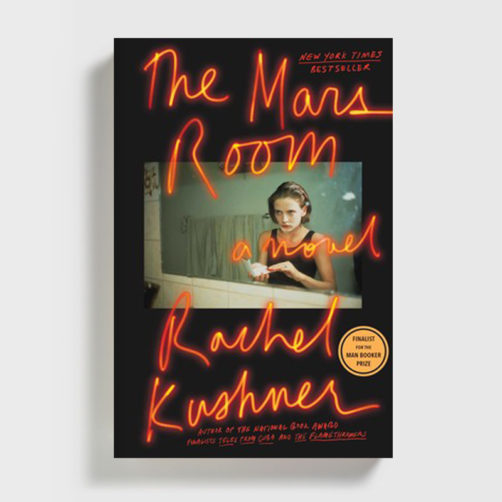
The Mars Room by Rachel Kushner
I absolutely loved The Mars Room. I find Rachel Kushner to be both exceedingly and subtly funny. While her characters and settings are unusual and surprising I felt immediately at home as a reader, zero acclimation time needed.
I read James Salter’s Light Years for the first time this year. It portrays domesticity as warm and sexy and complicated—the opposite of the exasperation that seems to dominate conversation about family life these days. It’s a book I know I will return to again and again.
EMILY BELL
• • •
I picked up James Baldwin’s collection of essays, The Fire Next Time, while on vacation in Paris this summer. Passionate, eloquent, and eerily prescient; I can’t say it gave me comfort but . . . it somehow just felt right to be hearing his voice at this very moment.
SARITA VARMA
• • •
One of my favorite FSG books of 2018 is Guy Gunarante’s In Our Mad and Furious City, which practically levitates with energy and life. And one of my favorite non-FSG books of the year is Karl Ove Knausgaard’s Spring.
ERIC CHINSKI
• • •
Lucia Berlin’s A Manual for Cleaning Women: I’m sure others will be writing about Evening in Paradise, etc., but I’m embarrassingly new to the gospel according to Lucia, having been recently indoctrinated by her 2015 collection. There’s a passage in The Argonauts in which Maggie Nelson describes how her partner “makes the brutal tender.” Berlin similarly locates the tender in the brutal, or vice versa. Her stories are stitched with recurring images—cruel mothers, roadsides, booze—but wonderfully undone at their ends.
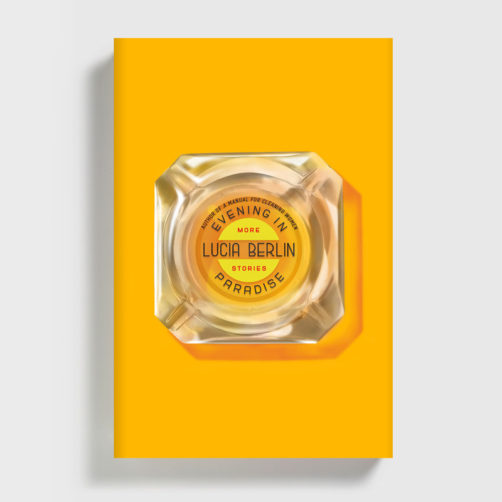
Evening in Paradise by Lucia Berlin
As someone who has as much desire for a human child as for getting my eyes gouged out (forgive me, I’ve been watching a lot of Yorgos Lanthimos), Sheila Heti’s inquisitive non-treatise Motherhood was a surprisingly affecting read. It’s as much about the author’s decision to resist, or succumb to, pressures of parenthood as it is about being someone’s child, birthing a book into the world, trauma, Jewishness, and continuity. In the end (beautiful, smart, jagged), my eyes were blinded only by my own TEARS.
Other books I’ve enjoyed, a number of which were recommended to me by the inimitable FSG intern, Julia Aizuss, who will be sorely missed (I can’t go on! I’ll go on): Rachel Cusk’s Kudos, Jenny Diski’s Don’t, Janet Malcolm’s Forty-one False Starts, Solmaz Sharif’s Look, Paul B. Preciado’s Testo Junkie, Helen DeWitt’s The Last Samurai, Susan Sontag’s Illness as Metaphor, Sally Rooney’s Conversations with Friends and Normal People, and Valeria Luiselli’s Tell Me How It Ends.
MOLLY WALLS
• • •
Broad Band by Claire Evans. In this book, a celebration of the forgotten women who were instrumental in constructing the history of computers, Claire Evans’s optimism about the future of women and technology is infectious.
Interior States by Meghan O’Gieblyn. In this intimate and beautifully written collection, O’Gieblyn explores the loss of her faith alongside the current crises of perhaps the most interesting part of the country right now: the Midwest.
NAOMI HUFFMAN
• • •
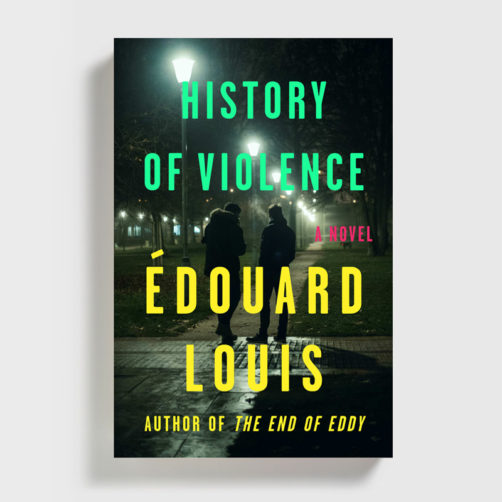
History of Violence by Edouard Louis
Family Lexicon, published in Italian in 1963, according to Natalia Ginzburg is a novel but, in Ginzburg’s own words, “the places, events, and people are all real.” It’s about the author’s family: their eccentricities, their private language, the passions that unite and divide them. It’s also about the rise of Mussolini and the horrors this family will eventually have to confront. The vitality, humor, and un-sentimentality in the novel led me to her collection of essays, The Little Virtues. One of these essays—England: Eulogy and Lament—contains an unforgettable (and very funny) passage about English food and exile. And one of them, He and I, is about marriage. It’s one of the most beautiful things I’ve read.
The other novel I loved this year also tells a true story: Edouard Louis’s History of Violence. From the very beginning, we know the plot: Louis was attacked and raped by a man he’d met on the street. The book is hard to put down not because we want to find out what happened—but because it tries so heartbreakingly hard to tell the truth.
MITZI ANGEL
THE FSG BOOKS WE’RE GIVING THIS YEAR
I’m a diehard Lakers fan, so Kobe’s The Mamba Mentality is getting sent to EVERYONE. I’ve given galleys of Chris Rush’s The Light Years to almost all of my queer friends—it’s a reckoning with home, and art, and queerness unlike anything I’ve read before. Lydia Kiesling’s propulsive and moving The Golden State is going to the several mothers in my life (except my mom, who already read it, and sobbed); Guy Gunarante’s In Our Mad and Furious City is going to a few of my fellow hip-hop heads (and British friends); and Lindsey Hilsum’s brilliant In Extremis is the perfect book for anyone who loves a remarkable true story, a page-turning biography, and a bad-ass, iconic woman.
JACKSON HOWARD
• • •
My favorite thing is when my two greatest passions—books and music—collide. If you have someone like this in your life, there is no better gift than Jeff Jackson’s Destroy All Monsters.
NIKKI BARNHART
• • •
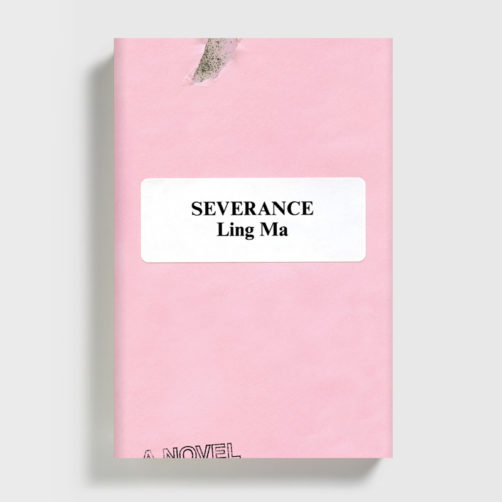
Severance by Ling Ma
I’ll be giving Welcome Home and Evening in Paradise to my mom, who’s a massive Lucia Berlin fan. My sister and my best friend will be receiving Severance. The Circuit to all of the tennis fans in my life, of which there are (surprisingly!) many. The Third Hotel to my horror-film-loving friend who also happens to be heading to Cuba for the holidays. And Impossible Owls to every single person who has heard me gush about how insanely talented Brian Phillips is.
CHLOE TEXIER-ROSE
• • •
The Collected Poems of T. S. Eliot: Volumes I and II, edited by Christopher Ricks and Jim McCue. No library is complete without this set! I’ll also give He Held Radical Light by Christian Wiman to my friends who love poetry. It’s a gorgeous read for anyone interested in religion and art, and slim enough to slip into a stocking.
LAUREN ROBERTS
• • •
I’m planning to give the Lucia Berlin books as gifts—they’re stunning inside and out—and to give The Moviegoer to family as well—a classic that still remains relevant. Also, I’ve already given Severance to many friends!
MAIA SACCA-SCHAEFFER
• • •
I’m looking forward to gifting copies of John Waters’s Role Models, Michael Gazzaniga’s The Consciousness Instinct and Rowan Ricardo Phillips’s The Circuit.
LAIRD GALLAGHER
• • •
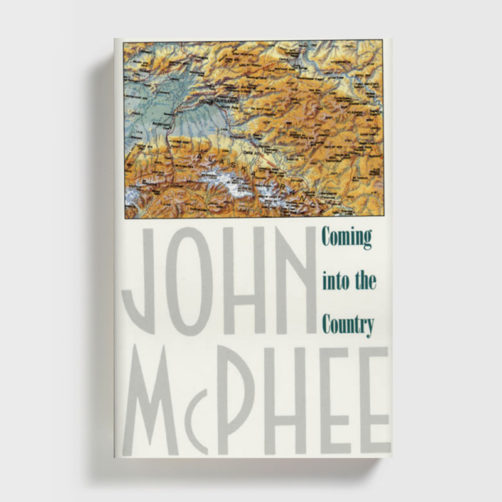
Coming into the Country by John McPhee
Coming into the Country by John McPhee: No one was more excited about me working at FSG than my father. A reader and writer through-and-through, my dad does not shut up about John McPhee. When I moved here (with two suitcases and a backpack), my dad shoved Draft No. 4 in my hands and said, “In case he ever comes into the office, will you have him sign this for me?” John McPhee is eighty-seven and lives in New Jersey—it just wasn’t going to happen. But then—in an act of nothing short of grace—we announced that McPhee would be in conversation with Paul Holdengraber at the New York Public Library about his newest book, The Patch, just after Thanksgiving. In short, my dad will be receiving a first edition of McPhee’s Coming into the Country (a Jim Tobin *absolute favorite*), signed and personalized. Don’t show this to him until after Christmas.
CLAIRE TOBIN
• • •
This year, I won’t be giving out copies of Guy Gunaratne’s excellent, Man Booker longlisted >In Our Mad and Furious City. Mostly because it’s my first acquisition and I’d really love it if people went out and actually bought it, instead. But also because everyone I know has already heard the entire plot and major themes of the book from me so many times that they might be annoyed if I gave them an actual copy. I’ve been pitching it as “the first proper Grime novel,” only to discover that many of my friends and colleagues don’t actually know what Grime music is. So, maybe I’ll give out copies of Skepta’s brilliant, 2016 Mercury Prize-winning album, Konnichiwa, instead.
DANNY VAZQUEZ
• • •
The Removes by Tatjana Soli—a complex take on the Battle of Little Bighorn and the surrounding forces affected. A prime example of historical fiction. The Outline trilogy is a knock-out. Though if you’re anything like my sister and need a plot-driven thriller, Our Kind of Cruelty or Severance are the better routes to take.
VERONICA INGAL
• • •
Hiking with Nietzsche, by John Kaag, for my dad, who loves Nietzsche. Territory of Light, by Yuko Tsushima, for my wife (this one’s a bit of a cheat, since the book doesn’t pub until early next year).
SCOTT AUERBACH
• • •
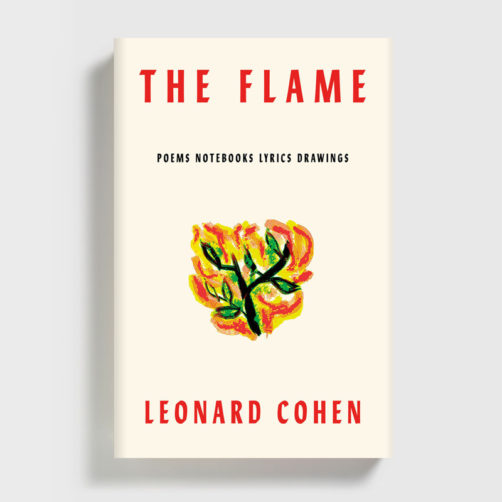
The Flame by Leonard Cohen
The Flame: Not just for Cohen fans, but for anyone with a poet’s heart. And it’s such a beautiful object! Ninety-Nine Glimpses of Princess Margaret: For royal family devotees and all my family members still in withdrawal from Downton Abbey—particularly the ones who felt deeply for Lady Edith. The Field of Blood: For all the folks who are surprised by the state of our political discourse. A Prayer Journal by Flannery O’Connor: For anyone plagued by anxiety, to help turn our attention back to the beautiful, to connection, and to how we might make sense of our places in this world.
JENNA JOHNSON
• • •
The Flame to friends who think they know Leonard Cohen. Muck to family who think they know Israel. Lucia Berlin to anyone who thinks they know how to live.
JEREMY DAVIES
• • •
I’ve been feeling pretty down about the state of things lately. Our environmentally wrecked, materialistic, late-capitalist world is a mess, and holiday gift-giving feels uncomfortably like opting in to all the bad stuff. My solution is to give everyone in my life a copy of Severance, Ling Ma’s brilliant (and entertaining!) novel about office work, consumerism, overseas factories, and zombies. It’s a delicious lampoon of global capitalism, with a little something for every kind of reader.
LYDIA ZOELLS
• • •
Ninety-Nine Glimpses of Princess Margaret, for all those rabid Downton Abbey and The Crown fans.
COLIN DICKERMAN
• • •
I’ll be giving Brian Phillips’s Impossible Owls to every person I know who loved John Jeremiah Sullivan’s Pulphead. It’s that good! And Josh Wheeler’s Acid West to my many extended family members who come from and live in the Southwest. A copy of Ling Ma’s Severance to my cousin who will graduate college next year and enter the workforce . . . HAVE FUN! And Lucia Berlin’s Evening in Paradise to, well, everyone.
EMILY BELL
• • •
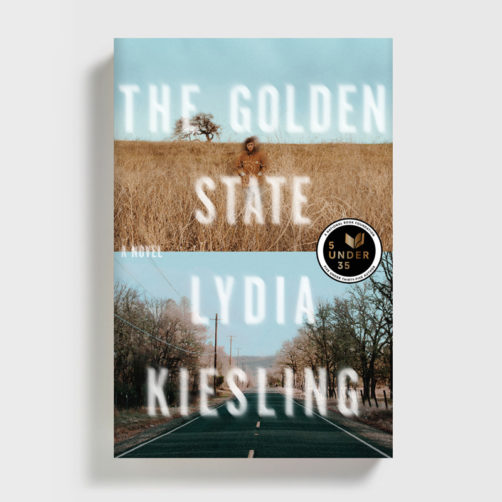
The Golden State by Lydia Kiesling
My favorite FSG books to give this year have been: The Golden State, and not only for new moms but anyone who appreciates a rich reading experience. Especially fun: Severance and The Best Bad Things for those who don’t typically gravitate towards dystopian or crime fiction, simply because these two titles play with those categories in all the best ways. The Lucia Berlin titles stun with their lyrical beauty; Ninety-Nine Glimpses of Princess Margaret for fans of The Crown, and The Mamba Mentality for sports lovers and anyone fascinated by the idea of perseverance.
SARITA VARMA
• • •
The Mere Wife by Maria Dahvana Headley: Because I love talking about the centuries of literature that have made women into monsters, whores, and maids, and Headley’s feminist retelling of Beowulf is an optimistic antidote.
NAOMI HUFFMAN
• • •
I wish I could give my friends Ghost Wall by the British writer Sarah Moss for Christmas, but alas we don’t publish it until January. It’s narrated by a lively, observant teenager whose domineering father takes his family on a camping trip with a difference: they are supposed to live as ancient Britons, foraging for food and wearing tunics. It’s funny, but soon becomes terrifying. Moss is a remarkable writer.
MITZI ANGEL
